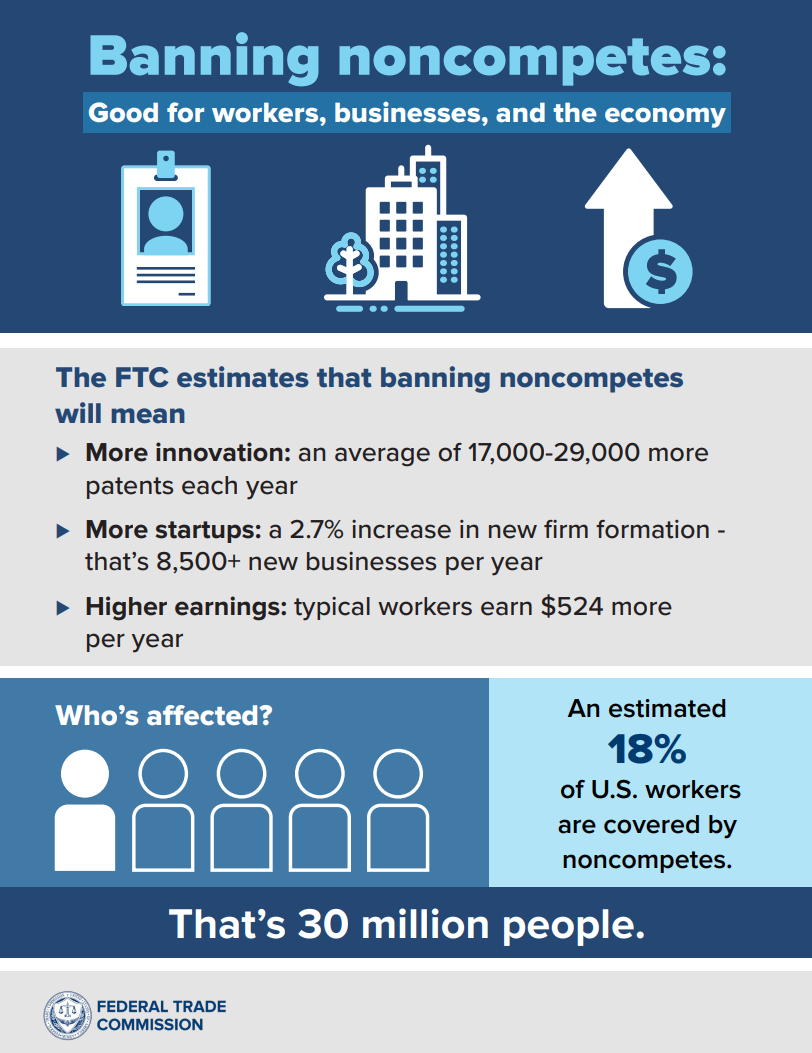What is the Non-Compete Agreement Ban 2024 and what does it consist of? Who benefits from this measure? The Federal Trade Commission (FTC) recently made headlines with a narrow 3-2 vote to prohibit non-compete agreements, a move expected to impact millions of American workers.
Here are five key facts about this significant development:
1. What Does the Final Rule Say?
The final rule, passed by a slim margin, effectively bans the implementation of new non-compete agreements for all workers. Additionally, companies are required to discard existing non-compete agreements for most employees. Notably, non-compete agreements covering senior executives may remain in effect, a concession from the original proposal.
2. How Many Workers Are Covered?
Estimates suggest that approximately 30 million individuals, representing around 18 percent of the U.S. workforce, are currently bound by non-compete agreements. These agreements span various job levels, from entry-level positions to top executives. The FTC projects that nullifying non-competes could potentially boost worker pay by a collective $300 billion annually and foster the creation of over 8,500 new businesses each year.
3. When Will It Go Into Effect?
The final rule is slated to become effective 120 days after its publication in the Federal Register. However, the timeline could be extended if legal challenges arise. The U.S. Chamber of Commerce, a prominent business lobbying group, has vowed to contest the rule’s implementation through legal means.
4. Who Opposes the Final Rule, and Why?
The U.S. Chamber of Commerce, along with other business associations, vehemently opposes the final rule. Chamber President and CEO Suzanne Clark criticized the decision as a “blatant power grab” that threatens the competitiveness of American businesses. Additionally, the HR Policy Association expressed strong opposition, emphasizing the need for employers to protect their investments through established legal means.
5. Will Congress Pass a Bill to Ban Non-compete Agreements?
Although the FTC lacks explicit authority from Congress to prohibit non-competes, bipartisan efforts to reform non-compete agreements have surfaced. Senators such as Chris Murphy, Todd Young, Tim Kaine, Kevin Kramer, Marco Rubio, and Maggie Hassan have introduced bills aimed at limiting the use of non-compete agreements and safeguarding American workers’ mobility and economic empowerment.
Public Support and Regulatory Process
Since the FTC’s initial proposal in January 2023, the agency has received substantial public backing, with over 26,000 comments largely in favor of the ban. Despite opposition from business trade groups, who argue for the preservation of intellectual property and corporate secrets, the FTC remains steadfast in its stance, urging companies to explore alternative safeguards like nondisclosure agreements.
FTC’s Role in Biden’s Antitrust Agenda
Tuesday’s vote aligns with President Biden’s broader efforts to combat corporate consolidation and market dominance. The FTC, alongside the Department of Justice’s antitrust division, has intensified scrutiny of corporate mergers and pricing practices, signaling a renewed focus on promoting competition and consumer welfare.
ALSO READ. DOL overtime rule 2024. Overtime pay is granted to 4 million workers: everything you need to know











